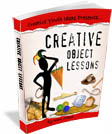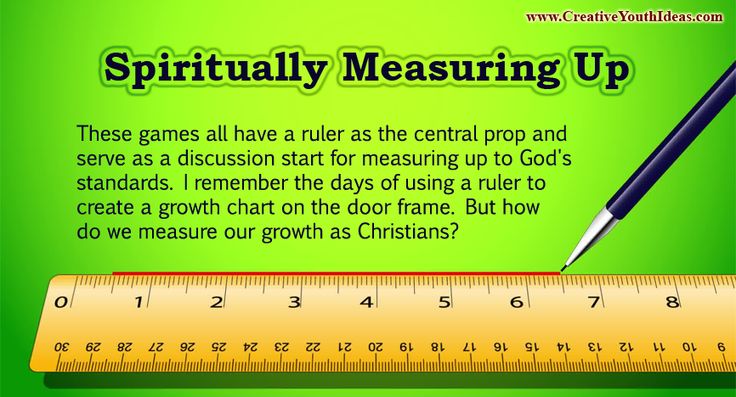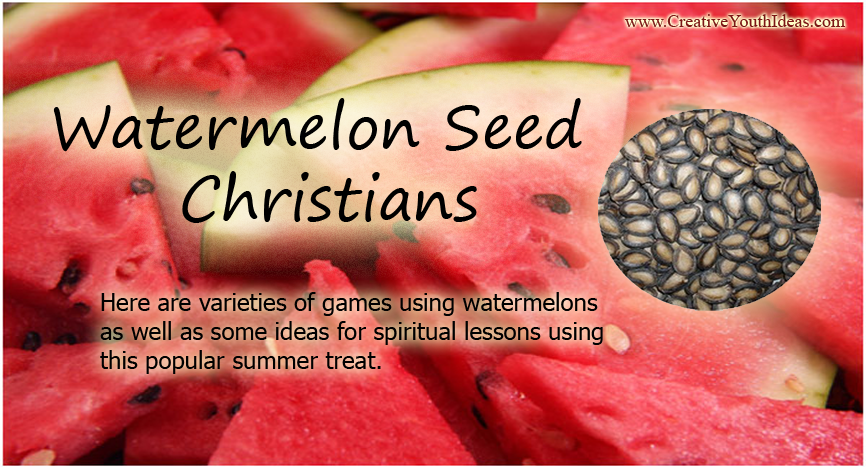It’s back to school time. Time to get all your school supplies and meet new friends. These games all have a ruler as the central prop and serve as a discussion start for measuring up to God’s standards. I remember the days of using a ruler to create a growth chart on the door frame. But how do we measure our growth as Christians?
PLEASE SHARE THIS IDEA ON FACEBOOK – CLICK BELOW
Games using a Ruler
- Back Flip Rulers – Back flip rulers is a variation of the minute-to-win-it game “Back Flip” The objective is simple – palms down, rest several rulers on the back of your hand. Now flip them up and catch them all in the same hand. Person who can catch the most rulers at once wins.
- Dice it Up – Another Minute-to-win-it game, youth must place a ruler into their mouth and stack a die on the end of the ruler. The die is not allowed to touch a youth’s nose or face. If the die falls off, the youth must choose another die to put on the ruler. Once the first die is in place, the player can pick up another die and put it on top of the first die. He has to continue adding a die until he’s stacked six die on top of one another. The dice have to be balanced for 3 seconds at least. First youth to be successful wins.
- Feather Relay – Give individuals or teams a ruler with a feather, leaf or some other light object on it. The idea is to see who can go across the room and back again, keeping the elusive object on his or her ruler. If the object blows off, it must be replaced before the contestant can continue.
- Herding Cats – Ever tried to herd a cat? They have a mind of their own. Give each team of youth one ruler and a cat (a lemon or raw egg.) Teams line up at the starting line, than at the signal, the first player pushes the cat to the goal and back using only the ruler. That player passes the ruler to the teammate who is next in line, and so on until all youth on a team have run. The team that finishes first wins. Other variations are to set up an obstacle course.
- Longest Line – Give each group a ruler and a few school supplies if you have some. Then give the following instructions – “Using what you have, create the longest line possible.” The key to this game is they have more than the objects you have given to them. They can use a belt, a shoe lace, keys, coins, paper money, etc to create a long line of objects. We often look to God to give us resources to get things done, but we often have more than we realise if we expand our thinking.
- Peas on a Ruler – Place a pile of peas (equal number of peas in each) for each team at one end of the room and an empty bowl for each at the opposite end. Give the first person in each line a ruler. Youth must run to their pea pile and scoop up as many peas on the ruler as they can, and bring them back and dump them into the empty bowl. They then give the rulers to the next person in line, who repeat the process. The first team to transfer its peas from the pile to the bowl is the winner. Any peas which fall along the way must also he picked up on the ruler and brought to the bowl. Players may have more than one run until all the peas are transfered, but must continue in the same order as they inititially began. They may not put the experts at the beginning of the line the second time through.
- Ruler Catapult – Take a ruler and a square rubber pencil eraser. Place the ruler on the edge of a book or table. Place the eraser at one of the ruler and slam the other end of the ruler towards the floor. HARD. Whoever can get the eraser to fly the furthest wins!
- Ruler Delivery – Choose a collection of objects of increasing size to be passed from the front of the line to the back of the line for each team using a ruler in each person’s mouth. First team to pass all the objects to the end of the line wins. Here are some ideas for objects: Cotton Balls, Ping Pong Balls, an egg (raw or hard boiled), marbles, lemon, apple, inflated balloon, ice cube.
- Ruler Fencing – Players hold a ruler with a square rubber eraser on it in one hand. In the other hand the players hold an empty ruler. Then they try to knock the opponents’ eraser off the ruler without losing their own eraser.
- Ruler of the world – roll a marble down a ruler and into a bowl. First team to do it successfully wins. Make it more difficult by using a yardstick or meter ruler.
- Rulers – This is the game of spoons but played with rulers. Depending on the number of players, you need at least one deck of cards, and one ruler less than the number of players. Players sit in a circle with the rulers in the middle of the circle with their ends touching. To begin, each player is dealt 4 cards. The first player picks up a card from the top of the pile, and can choose to keep it, or pass it to the person on his or her left. Players can only hold a maximum of four cards. When someone gets four of a kind, he grabs a ruler. Once one person grabs a ruler, everyone else also grabs one until all the rulers are gone and 1 person is left without a ruler. Play resumes with one less player and one less ruler. Play continues until there is only one player left, the winner.
- Standing Broad Grin – Measure everyone’s grin with a ruler to see who has the widest smile. Offer first, second, and third place prizes to the biggest smiles.
- Tallest Tower – Bring in a variety of school supplies, including a ruler. Each team of students must create the tallest tower using the supplies you have provided. Then bring the school supplies back together and command the them to create the tallest tower. Of course the tools will simply lie where they are put. NOTE: These tools are very useful, but only when they are in someone’s hands. The same thing is true of us. We can be useful to God, and be used to teach others life changing truths, but only when we place ourselves in God’s hands.
Main Lesson Idea – Measuring Up
Measuring Up – Participants must scour the room and use a ruler find objects that match the measurements they are given… first to get them all correct gets a prize. You must first of course, make a list of measurements of various items found in the youth room or throughout the church.
Rules
- Teams must stay together as a group. You may not split up.
- Stay within the designated game area. Any group found outside the game area or in banned areas will be disqualified.
- No communicating or collaborating with other teams.
- Be respectful and courteous in everything you do. Crude language, inappropriate behavior, and offensive actions are not allowed. Respect other people’s property. Do not destroy things. When the hunt is over, there should be no sign that it took place.
- Respect each other. Do not cheat. Do not hinder other teams.
Scoring
- Only one submission for each item on the list. Multiple submissions are not allowed. Label submissions with corresponding numbers so the judges know which items are intended for which things on the list. You are not required to complete every item on the list.
- Teams can only qualify once for each item on the list.
- Stick to the Time Limit. A penalty will be imposed for each minute after the deadline that you are late. In case of a tie, the first team to finish wins.
- How to Win? Points will be assigned to these based on the difficulty to accomplish each, creativity and the fun factor. The team with the most points wins!
TAKE IT TO THE NEXT LEVEL
MAKE IT SPIRITUAL
- What are some things people use to measure or evaluate living a good life?
- What are some things people use to measure other people?
- What are some things people use to measure themselves?
- How do we measure a person as a success or failure?
- What are some of the standards of measurement from God’s Word?
You might give them some helpful scriptures to write on their rulers:
- Love – I Corinthians 13:4-7
- Holiness – Hebrews 12.14; Revelation 21.27
- Righteousness – 2 Corinthians 5:21, Romans 3:23
- Christian Living – Romans 12:10-21
- Maturity – Ephesians 4:1-13
Discussion: If your ruler had been marked wrongly, you would have found it difficult to find any of the objects. When our measurements of obedience, ourselves (pride), expectations (jealousy), comparisons with others, and timing (patience) are wrong it messes up our results. Our standards for measurement must be exact and based on God’s Word or every measurement we make will be wrong. God’s Word is to be the ruler for our life. When we use other things as rulers our measurements come out wrong.
MAKE IT PRACTICAL
In the Old Testament, the focus on godliness was living by God’s Laws and commandments. But as a Christian, the focus of the life is no longer the laws and standards, but instesd focused on a person – Christ. It’s not a set of rules but a relationship. We are to follow Christ and live for Him.
- Romans 6:14 “For sin shall no longer be your master, because you are not under the law, but under grace.”
- Romans 8:1-17
- What difference does it make in the way you live your life to know that you are no longer under the law, but under grace?
- Under the law you are fearful of making a mistake, but under grace you are focused on pleasing God and acting out of gratitude. How does this make a difference in how you live life?
MAKE IT PERSONAL
- How do you measure your life? How do you measure up?
- What are some of the things you use to measure your spiritual growth? Your spiritual journey?
- In what way does Grace give you freedom to live more effectively for Christ?
SCRIPTURE
Romans 3:23 – “For all have sinned, and come short of the glory of God” – We don’t measure up to God’s standard.
Ephesians 2:8-10 – “For it is by grace you have been saved, through faith—and this is not from yourselves, it is the gift of God — not by works, so that no one can boast. For we are God’s handiwork, created in Christ Jesus to do good works, which God prepared in advance for us to do.” – Because we don’t measure up, we cannot boast. This free us to advance in good works, not out of striving to be worthy.
Ephesians 4:11-12 – “So Christ himself gave the apostles, the prophets, the evangelists, the pastors and teachers, to equip his people for works of service, so that the body of Christ may be built up until we all reach unity in the faith and in the knowledge of the Son of God and become mature, attaining to the whole measure of the fullness of Christ.” – our goal is to measure up to the life of Christ.
Galatians 2:16 – “know that a person is not justified by the works of the law, but by faith in Jesus Christ. So we, too, have put our faith in Christ Jesus that we may be justified by faith in Christ and not by the works of the law, because by the works of the law no one will be justified.”
Hebrews 12:1 – “Therefore, since we are surrounded by such a great cloud of witnesses, let us throw off everything that hinders and the sin that so easily entangles. And let us run with perseverance the race MARKED OUT for us.” God still marks out a direction for us to strive toward as Christians.
2 Corinthians 5:21 – “God made him who had no sin to be sin[a] for us, so that in him we might become the righteousness of God.” – We don’t have to measure up to righteousness because we wear Christ’s righteousness.
Colossians 2:13-14 – “When you were dead in your sins and in the uncircumcision of your flesh, God made you alive with Christ. He forgave us all our sins, having canceled the charge of our legal indebtedness, which stood against us and condemned us; he has taken it away, nailing it to the cross.” – God wiped away the shortcoming so that before him we measure up in Christ.
2 Peter 1:3-9 – “His divine power has given us everything we need for life and godliness through our knowledge of him who called us by his own glory and goodness. Through these he has given us his very great and precious promises, so that through them you may participate in the divine nature and escape the corruption in the world caused by evil desires. For this very reason, make every effort to add to your faith goodness; and to goodness, knowledge; and to knowledge, self-control; and to self-control, perseverance; and to perseverance, godliness; and to godliness, brotherly kindness; and to brotherly kindness, love. For if you possess these qualities in increasing measure, they will keep you from being ineffective and unproductive in your knowledge of our Lord Jesus Christ. But if anyone does not have them, he is nearsighted and blind, and has forgotten that he has been cleansed from his past sins.” – Now we are measure by growth in the our journey to becoming more and more Christlike.
PLEASE SHARE THIS IDEA ON FACEBOOK – CLICK BELOW
 MORE IDEAS? See “Creative Object Lessons”
MORE IDEAS? See “Creative Object Lessons”
200 page e-book that explains everything you need to know when planning your very own object lessons. It contains 90 fully developed object lesson ideas and another 200 object lesson starter ideas based on Biblical idioms and Names / Descriptions of God.
![]()



